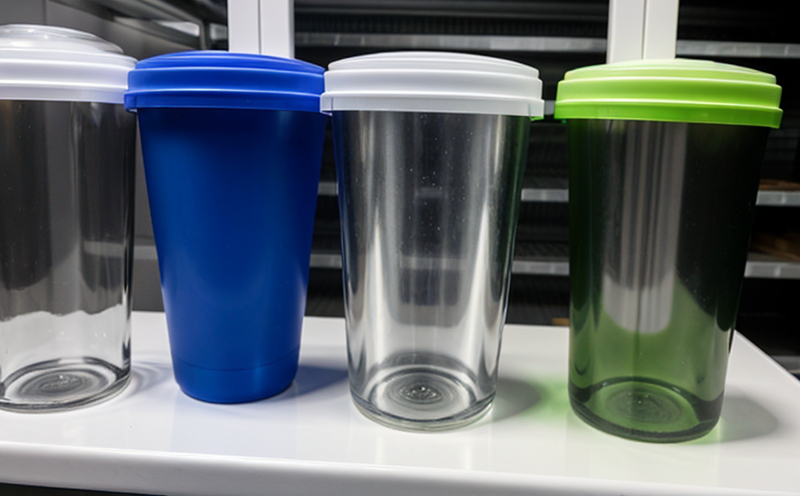ISO 719-2 Glass Hardness under Load
The ISO 719 series of standards provides a comprehensive framework for testing glass mechanical properties. Among these is ISO 719-2: Determination of hardness of glass under load by means of the scratch test method with a diamond indenter. This particular standard is instrumental in assessing the resistance to indentation of glass materials, which is critical for ensuring product quality and safety across various industries such as food packaging, pharmaceuticals, and consumer goods. The test evaluates how well a given type of glass can withstand mechanical stress without failing under specific loading conditions.
The procedure involves applying defined loads at controlled rates until the sample shows signs of plastic deformation or fracture. This testing method is particularly useful for understanding the behavior of different types of glass under real-world conditions where they might experience various forms of physical strain. By conducting this test, manufacturers can optimize their products to meet rigorous standards set by regulatory bodies and industry specifications.
The scratch test described in ISO 719-2 provides insights into the structural integrity of glass packaging materials during manufacturing processes or while being used in harsh environments like high humidity or temperature fluctuations. It helps identify potential weaknesses that could lead to premature failure, ensuring higher levels of reliability and performance. Additionally, this testing approach allows for the comparison between different batches of raw materials, enabling better quality control throughout production cycles.
One key aspect of ISO 719-2 is its focus on replicating realistic loading scenarios encountered by glass packaging in everyday use. This ensures that the results obtained from laboratory testing accurately reflect real-world performance. For instance, if a particular type of glass is intended for food containers subjected to frequent handling and exposure to acidic substances, knowing how it behaves under such conditions helps manufacturers make informed decisions about material selection.
Another important consideration when performing ISO 719-2 tests is proper specimen preparation. Ensuring that the sample has been cut to precise dimensions according to specified guidelines ensures consistent results across multiple trials. Additionally, maintaining uniformity in terms of surface finish and orientation can significantly impact outcome consistency. Proper preparation also includes cleaning any contaminants off the specimen before testing begins.
When interpreting ISO 719-2 test results, it's essential to understand what constitutes an acceptable level of hardness for a particular application. Manufacturers often refer back to industry standards like ASTM D6580 or EN 348 when establishing these thresholds. These documents provide guidance on appropriate values based on factors such as the intended use case and expected environmental exposures.
The scratch test described in ISO 719-2 is not only valuable for assessing individual pieces of glass but also serves as a tool for comparing different formulations or production methods used within a company. Through regular testing, companies can monitor trends over time and make adjustments to improve overall product quality. Furthermore, this kind of data can be shared with suppliers during procurement negotiations, helping ensure consistent quality from batch to batch.
In conclusion, ISO 719-2 provides a robust methodology for evaluating the hardness properties of glass under load conditions. By following strict procedures outlined in the standard and interpreting results correctly, manufacturers can enhance their products' durability and reliability while meeting regulatory requirements.
Benefits
- Enhances Product Quality: Ensures that glass packaging meets stringent mechanical property standards.
- Safeguards Consumer Health: Guarantees that containers used for food and beverages are robust enough to prevent leaks or breaks.
- Promotes Compliance: Helps companies adhere to international regulations governing pharmaceutical packaging materials.
- Improves Durability: Identifies areas where glass formulations can be strengthened, leading to longer-lasting products.
- Supports Innovation: Provides valuable data for researchers developing new types of glass that offer superior mechanical properties.
- Aids Supplier Selection: Enables purchasers to choose reliable suppliers who consistently deliver high-quality materials.
The benefits extend beyond just manufacturing; they also encompass supply chain management, inventory control, and customer satisfaction. By investing in ISO 719-2 testing services, businesses demonstrate their commitment to excellence in every aspect of product development and distribution.
Quality and Reliability Assurance
Implementing ISO 719-2 glass hardness under load tests forms an integral part of a broader quality assurance strategy aimed at maintaining consistent performance across all stages of production. Here’s how it contributes to overall reliability:
- Consistency in Specifications: Ensures that each batch produced adheres strictly to predefined mechanical property requirements.
- Prediction Capabilities: Allows companies to predict potential issues early on, allowing for timely corrective actions before they become critical problems.
- User Trust: Demonstrates commitment to safety and quality, thereby fostering trust among customers who rely heavily on glass packaging for their products.
- Regulatory Compliance: Meets or exceeds all relevant regulatory standards, ensuring that the final product is fit for purpose.
In addition to these tangible advantages, there are intangible benefits as well. For example, successful implementation of such testing protocols fosters a culture of continuous improvement within organizations. Employees become more engaged in their work knowing that they contribute directly towards improving end-user experiences and satisfaction levels.
Furthermore, the use of advanced technologies like automated systems for specimen preparation enhances accuracy and reduces human error during manual tasks. This leads to improved efficiency throughout operations while maintaining high standards of quality assurance.





